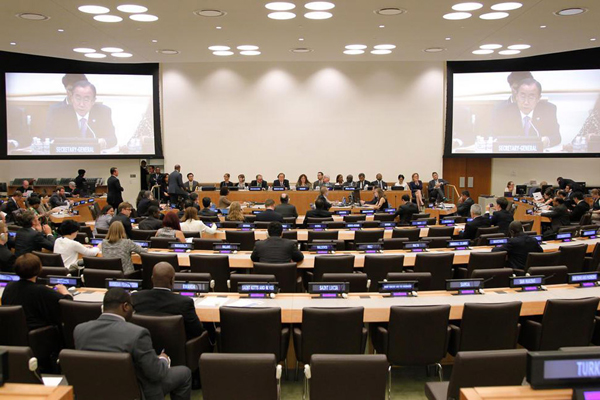
Amid multiple crises, 'responsibility to protect' more urgent than ever UN officials
“The adoption of the responsibility to protect at the 2005 World Summit embodied a collective determination to counter atrocity crimes with resolve. On Monday, this commitment is being severely tested,” Secretary-General Ban Ki-moon said in his remarks to a dialogue held by the Assembly.
“Our collective responsibility to protect demands far more from us at this deeply troubling time for all humankind,” he stated.
Ban said the world faces a series of conflicts that feature acts that “shock the global conscience” – from the horrors unfolding in Iraq and Syria, to persistent violence against civilians in South Sudan, the Central African Republic, Ukraine, Nigeria, Pakistan, Gaza and elsewhere.
“These crises illustrate the human costs of failure: the failure to confront the rise of extremist ideology that propagates hate and manipulates inter-communal differences for political gain; the failure of States to protect their own populations; and the failure of the international community to react to early warning signs or to respond adequately once atrocity crimes are taking place,” he stated.
“Turning a blind eye to these acts is no longer tenable. Our responsibility to prevent and protect is collective and urgent.”
Sometimes referred to as ‘R2P,’ the principle of the responsibility to protect holds States responsible for shielding their own populations from genocide, war crimes, ethnic cleansing, and related crimes against humanity and requires the international community to step in if this obligation is not met.
The Secretary-General’s latest report on the issue offers a series of specific recommendations for improving international assistance to States seeking to protect their populations. He noted that action on a variety of fronts is needed to strengthen the capacity of States and the international community to protect populations at risk of atrocity crimes.
“We should target our efforts towards populations we know are vulnerable, and support those capacities that specifically inhibit atrocity crimes,” he said.
“We are approaching the end of the first decade of the responsibility to protect. The principle has made unprecedented progress,” Ban added. “We must now build on these foundations by crafting an ambitious vision for the next 10 years and by acting decisively on our responsibilities.”
Speaking on behalf of Assembly President John Ashe, Vice-President Isabelle F. Picco recalled that Member States in 2005 affirmed that the international community has a responsibility to protect populations from genocide, war crimes, ethnic cleansing and crimes against humanity.
“Nearly 10 years on, we are still reckoning with its implications and where and how to act on and implement this decision,” she stated.
Picco noted that in the Secretary-General’s first report, in 2009, he proposed a strategy for the implementation of the responsibility to protect based on three equal, non-sequential, and mutually reinforcing pillars. Pillar I focuses on the protection responsibilities of the State; Pillar II on international assistance and capacity-building; and Pillar III on timely and decisive response when national authorities manifestly fail to protect their populations.
Support for the principle has steadily expanded, she said, leading to a growing consensus on its key elements, including that: its scope is limited to the protection of populations from atrocity crimes; primary responsibility lies with national authorities; prevention must remain the priority; and implementation must take place in accordance with the UN Charter and other established principles of international law.
“It comes as no surprise to any of us that even as we meet on Monday, crimes of immense darkness overtake parts of our world. Our job is to make what we discuss here in this room relevant for them; to give true life and meaning to our reports, discussions and theories,” said Picco.
A wide view of the informal interactive dialogue on the responsibility to protect as Secretary-General Ban Ki-moon (on screens) addresses the General Assembly. UN Photo/Devra Berkowitz
Support Our Journalism
We cannot do without you.. your contribution supports unbiased journalism
IBNS is not driven by any ism- not wokeism, not racism, not skewed secularism, not hyper right-wing or left liberal ideals, nor by any hardline religious beliefs or hyper nationalism. We want to serve you good old objective news, as they are. We do not judge or preach. We let people decide for themselves. We only try to present factual and well-sourced news.







